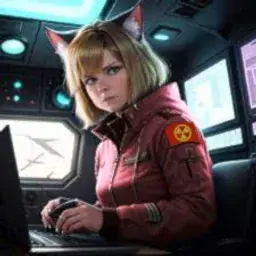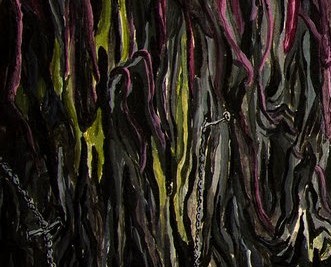I like both, but I've always leaned toward science fiction myself. I have an easier time finding deep and thought-provoking stories in the science fiction genre, and I tend to prefer its more emphasis on exploring what its possibilities mean and using them to examine ourselves.
Book of the New Sun baybeeeee! Really anything by Gene Wolfe is great.
I think sci fi asks more interesting questions, and opens up more assumptions about society being questioned as norms in how it develops its world building. fantasy can do that, but 9/10 is just Tolkien shit again BUT THIS TIME WITH X new CRAZY idea for their politics/magic system/bad guys, that actually are not all that new
Not sure. Sometimes sci-fi gets a little too freaky for my small brain and I’m often too lazy to seek out more unique fantasy stuff when the medieval European/LotR clones bore me.
Though similar to what steve said, I like when media blurs the line between the two. Anyone remember Bionicle? That twist towards the end was neat.
Ooh, urban fantasy is usually fun.
Bionicle fuckin rocks. Also, Lego basically opening up the ip for fan projects is good.
I've been scratching my itch for fantasy with Chinese cultivation novels, it's like a refresh of the genre with a different mythological basis. And cultivation is fun, its like rpg levels but without the weird quasi rpg world of Japanese stuff.
I remember Bionicle but I never really got into it. What was the twist?
Assuming you remember some stuff about the premise:
Wacky scientists built a planet sized robot to explore space as their planet blew up from a war
over oil.It’s revealed the little villager dudes are essentially maintenance nanobots for said robot. They forgot their purpose after first becoming self aware and later the Big Bad introducing a virus that ended up crashing the robot as it was returning to fix the homeworld. An island grew over the robot’s face and the survivors from its brain city did an anprim and settled the surface.
The story suddenly flips from saving and waking up the villagers’ god (who shares his name with both the island and the giant robot, wink wink) to fixing the robot and learning how to carry out its final mission.
It was really fun looking back at all the hints the story crew sprinkled throughout Bionicle’s 10 year run. Stuff like these bug dudes coming out of nowhere to wipe out the island and its villages - a poorly timed malfunction meant to clear the bot’s face for take off. The climax taking place somewhere that means “great heart” in the lore and where they basically do a little open heart surgery and shock him back to life. It only became obvious to most people like the moment it happened, which made the payoff super satisfying.
I never got past that scene, but from what I understand he’s called the “unbeliever” because he doesn’t believe the world he’s in is real. Over time he comes to understand that it is and regrets his actions as monstrous. I think you could readily argue the point that it still wasn’t appropriate (I mean, I could never read them because of that scene) but the authorial intent, however garbled, wasn’t really to fetishize or glorify.
I love both equally. There's honestly not a ton of difference between the two. Pretty much all sci-fi/fantasy can be boiled down to one of two things:
- Spectacle. "Ooooh, cool magic!" or "Ooooooh, cool robots!" I don't mean this in a derogatory sense, just in the sense that the purpose is mostly exploring this fantastical world that's different from reality. Your Star Wars' and Lord of the Rings' and such largely fall under here.
- Allegorical. "We wanted to make a story about how segregation bad, but it's 1970s America so we can't do that, so instead we made up an alien planet where blue-skinned people get treated like shit by red-skinned people while our cast explains why this is stupid." A lens to view the real world with a degree of separation to make a point. Your Star Treks' and Dunes' and, as much as Tolkien hates me for saying this, also your Lord of the Rings' fit here.
There's a lot of overlap between the two categories, but the combination of both is really the heart and soul of both genres.
There's this, and there's also I think "exploratory": what happens if you take the human condition and knock out a couple of things? Things like Left hand of darkness, and a bunch, though not all alternate history is this
If we're buying this binary, I'd say more in (2). The movie's big focus is on the process stuff surrounding discovery and engineering, and almost all the protagonists' trouble comes from their irresponsible and reckless misuse of a new technology (as well as interpersonal conflict), rather than because of anything intrinsic to the technology itself. I think you can read it as a kind of argument for technology being "neutral," and the moral valence of tools coming from the reactive attitudes and use-behaviors of intentional agents.
That's a good callout. And as the maker of this very spur-of-the-moment binary, I'd agree that speculative fiction built around how people would react to $shiny_new_tech_or_magic falls under the broad category of allegory. I suppose I should rename that category something along the lines of "lens we view the real world through" instead.
Fantasy. With sci-fi my brain either reflexively starts poking holes in all of the fake science stuff, or immediately zones out because someone decided to publish a physics textbook with a couple plot elements that start in chapter 15
Wtf I've always found the opposite. Maybe I haven't read enough or I'm biased. The first time I ever heard of a gay person was through a cyberpunk novel
Idk I played a lot of DnD as a woman before realizing I was actually a woman the whole time.
Got any good recs?
I also like both, scifi I end up finding errors with, especially the old classics and it makes it harder to enjoy, fantasy, well magic don't have to explain shit unless the author is a lore addict.
The Expanse is really good for layperson hard sci-fi. I expect if I knew more about orbital mechanics I might be annoyed, and there are arguably some moments of "stealth in space" that shouldn't work (those are at least quite rare and mostly reasonably explained), but the writing is pretty solid and the story has me genuinely invested.
I've been split down the middle for a while now I can lean either way right now
I like both but I find better stories generally in Sci-Fi. It's great when a series has bits of both, like Final Fantasy, which changes hands from Sci-Fi stories to fantasy from game to game.
I like both but I tend towards fantasy simply cause i have lower standards for it. Mediocre fantasy can still be fun, mediocre sci-fi is just painful.














